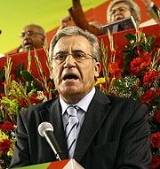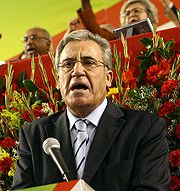
Jerónimo de Sousa
Encyclopedia

Portuguese Communist Party
The Portuguese Communist Party is a major left-wing political party in Portugal. It is a Marxist-Leninist party, and its organization is based upon democratic centralism. The party also considers itself to be patriotic and internationalist....
since the 17th Congress of the Party in November 2004.
He is a member of the Assembly of the Republic
Assembly of the Republic
The Assembly of the Republic is the Portuguese parliament. It is located in a historical building in Lisbon, referred to as Palácio de São Bento, the site of an old Benedictine monastery...
and was also a candidate in the Portuguese presidential election of 2006
Portuguese presidential election, 2006
The Portuguese presidential election were held on 22 January 2006 to elect a successor to the incumbent President Jorge Sampaio, who was term-limited from running for a third consecutive term by the Constitution of Portugal...
.
Early life and leftist activity
Born at Pirescôxe (also known as Pirescouxe, Pirescoche, Piriscouxe and Pires Coche), located in Santa Iria de Azóia, LouresLoures
Loures Municipality is a municipality to the north of Lisbon. Created on 26 July 1886 by a royal decree, the municipality currently occupies an area of 169 km² and has about 200,000 inhabitants . It borders the municipalities of Odivelas, Sintra, Mafra, Arruda dos Vinhos, Vila Franca de Xira...
, Lisbon District, Jerónimo de Sousa was born into a humble working class family in the Portugal
Portugal
Portugal , officially the Portuguese Republic is a country situated in southwestern Europe on the Iberian Peninsula. Portugal is the westernmost country of Europe, and is bordered by the Atlantic Ocean to the West and South and by Spain to the North and East. The Atlantic archipelagos of the...
of the late 1940s, dominated by the right-leaning regime of António de Oliveira Salazar
António de Oliveira Salazar
António de Oliveira Salazar, GColIH, GCTE, GCSE served as the Prime Minister of Portugal from 1932 to 1968. He also served as acting President of the Republic briefly in 1951. He founded and led the Estado Novo , the authoritarian, right-wing government that presided over and controlled Portugal...
.
At the age of fourteen, he followed the path of the most children of the many working class families of the industrial belt of Lisbon
Lisbon
Lisbon is the capital city and largest city of Portugal with a population of 545,245 within its administrative limits on a land area of . The urban area of Lisbon extends beyond the administrative city limits with a population of 3 million on an area of , making it the 9th most populous urban...
, becoming a machine tuner in a siderurgy near his hometown, the MEC.
He started his anti-fascist activities soon after, while integrating the cultural working class associations of his hometown in the 1960s. In that period he made contact with the strong clandestine organization that the Portuguese Communist Party
Portuguese Communist Party
The Portuguese Communist Party is a major left-wing political party in Portugal. It is a Marxist-Leninist party, and its organization is based upon democratic centralism. The party also considers itself to be patriotic and internationalist....
had in the suburbs of Lisbon, where he, being one of the few able to read, used to read the illegal communist newspaper, the Avante!
Avante!
Avante! is the official newspaper of the Portuguese Communist Party . Founded in 1931, it continues to be published to this day...
, in secrecy, for the other workers. He would later formalize his membership, right after the Carnation Revolution
Carnation Revolution
The Carnation Revolution , also referred to as the 25 de Abril , was a military coup started on 25 April 1974, in Lisbon, Portugal, coupled with an unanticipated and extensive campaign of civil resistance...
, in 1974.
From 1969 to 1971, Jerónimo de Sousa participated in the Colonial War
Colonial war
Colonial war is a blanket term relating to the various conflicts that arose as the result of overseas territories being settled by foreignpowers creating a colony...
, against the liberation movements that were struggling in the Portuguese colonies in Africa. He served in Guinea-Bissau
Guinea-Bissau
The Republic of Guinea-Bissau is a country in West Africa. It is bordered by Senegal to the north, and Guinea to the south and east, with the Atlantic Ocean to its west....
, forced to fight the Marxist movement of liberation, the PAIGC.
After the replacement of Salazar by Marcello Caetano in 1969, the regime made some slight democratic openings, one of them was the possibility of workers without any record of illegal political activity participate in the elections for the respective Unions
Trade union
A trade union, trades union or labor union is an organization of workers that have banded together to achieve common goals such as better working conditions. The trade union, through its leadership, bargains with the employer on behalf of union members and negotiates labour contracts with...
. In 1973 he participated in the election for the leadership of the Lisbon
Lisbon
Lisbon is the capital city and largest city of Portugal with a population of 545,245 within its administrative limits on a land area of . The urban area of Lisbon extends beyond the administrative city limits with a population of 3 million on an area of , making it the 9th most populous urban...
Metallurgical Workers' Union, dominated by the collaborationists of the regime, a characteristic of the corporativist regime of Salazar. Being free of any political suspicion and after being chosen among the MEC workers to integrate the list to the Lisbon Union, he was able to participate in the election and his list, influenced in secrecy by the communists, won it. From April 1974 he was elected to the workers commission of MEC, a role he kept until 1995.
Activity after the Carnation Revolution of 1974
In the first democratic election in the country's history, that was meant to elect a parliament that would write a new democratic ConstitutionConstitution of Portugal
The first Portuguese Constitution was drafted in 1822. Several revolutions led to the constitutions of 1826 , 1838 , 1911 , 1933 , and 1976 ....
, Jerónimo de Sousa was elected as an MP. Entering the Assembly of the Republic for the first time, a curious thing happened: a worker at the Assembly called him "doctor", he answered he was not a doctor and the worker replied: "sorry engineer", expressing the weirdness associated with the presence of a factory worker in a chamber that was dominated for 48 years by the top figures of the regime.
He continued to be elected in the subsequent legislative elections, and only left parliament in 1993. In 2002, he returned after the legislative election of that year
Portuguese legislative election, 2002
The Portuguese legislative election of 2002 took place on March 17. These elections were called after the resignation of the former Prime-Minister, António Guterres after a defeat of the Socialist Party in the local election of 2001...
.
Meanwhile, Jerónimo was elected for the first time to the Central Committee
Central Committee
Central Committee was the common designation of a standing administrative body of communist parties, analogous to a board of directors, whether ruling or non-ruling in the twentieth century and of the surviving, mostly Trotskyist, states in the early twenty first. In such party organizations the...
of the PCP in 1979 and became a member of its Political Bureau in 1992.
He was the Party's candidate to the presidential election of 1996
Portuguese presidential election, 1996
The Portuguese presidential election of 1996 was held on January 14.Incumbent president Mário Soares was constitutionally barred from a third term....
, but he left the race giving his support to the Socialist
Portuguese Socialist Party
The Portuguese Socialist Party was a political party in Portugal.The party was founded in 1875. During its initial phase the party was heavily influenced by Proudhonism, and rejected revolutionary Marxism. The party suffered constant factional struggles...
candidate, Jorge Sampaio.
In 2004, after the Party's 17th Congress, in November, Jerónimo de Sousa was elected General Secretary, replacing Carlos Carvalhas
Carlos Carvalhas
Carlos Alberto do Vale Gomes Carvalhas, GCC is a Portuguese politician and former Secretary-General of the Portuguese Communist Party , succeeding the historical leader Álvaro Cunhal....
.
He was announced as the Party's candidate for Portuguese presidential election, 2006
Portuguese presidential election, 2006
The Portuguese presidential election were held on 22 January 2006 to elect a successor to the incumbent President Jorge Sampaio, who was term-limited from running for a third consecutive term by the Constitution of Portugal...
, and also gathered the support of the Ecologist Party "The Greens".

